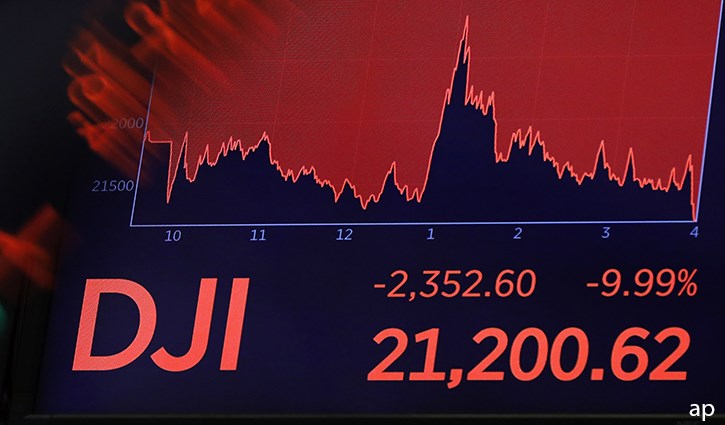
While the impact of the coronavirus pandemic on global stock markets is clear to see, it's harder to discern its effect on private equity markets. Investors in unlisted companies don't have the option to buys and sell shares at a moment's notice as they do with businesses listed on the stock market, but that doesn't mean these firms can't see their valuations plunge during a crisis.
Private equity is typically viewed as a risky area of investment. Lack of liquidity is a prime concern as it can take a long time to offload an investment, and fledgling businesses are often prone to failure. Concerns around the risk of the sector were raised last year during the high-profile collapse of the Woodford Patient Capital Trust, which was taken over and renamed by Schroders after embattled investor Neil Woodford closed his eponymous fund firm.
Investment trusts have been caught up in the market turmoil of recent months and private equity trusts have not come out unscathed; Morningstar Direct data shows the average Private Equity investment trust is down 20.1% year to date. That compares with the FTSE 100, which is still down 20% year to date, and the S&P 500, down 13%.
Just one of the 14 trusts in the sector, BMO Private Equity Trust (BPET), is in positive territory, with its share price up 2.42% year to date. Its peers, meanwhile, have seen their share prices tumble by as much as 49%.
| Fund | Morningstar Rating | YTD Return (%) |
| BMO Private Equity Trust | N/A | 2.42 |
| HgCapital Trust | 5 | -7.57 |
| JPEL Private Equity | N/A | -12.77 |
| Standard Life Private Equity | 5 | -17.99 |
| Princess Private Equity | 5 | -19.73 |
| Apax Global Alpha | 5 | -23.17 |
| 3i | 5 | -25.94 |
| Oakley Capital Investments | 5 | -26.05 |
| HarbourVest Gbl Private Equity | 5 | -26.59 |
| NB Private Equity Partners | N/A | -29.19 |
| Pantheon International | 5 | -29.40 |
| ICG Enterprise Trust | 5 | -30.21 |
| Symphony Int'nal Holding | 2 | -49.03 |
Source: Morningstar Direct, data as of May 22, 2020.
At the bottom of the table is two-star rated Symphony International (SIHL), which has seen its share price almost halve so far this year. In particular, the negative trend was predominantly due to a 53% decline in the share price of one of its holdings, Minor International (MINT), and a fall in the value of Thai baht.
Bangkok-based Minor is a multi-national company whose three core businesses are hospitality, restaurants and lifestyle brands distribution, operated under subsidiary companies Minor Hotels, Minor Food, and Minor Lifestyle. These industries have been severely impacted by the Covid-19 pandemic with government-directed hotel closures the world over, as well as limitations on restaurant operations and overall weaker demand.
In line with the overall stock markets
With their portfolios stuffed with unlisted companies, it may surprise that the performance of private equity trusts has tracked so closely with the UK stock market. Yet William Heathcoat Amory, founding partner at Kepler Partners, believes these vehicles still provide much-needed diversification away from the FTSE.
Private equity investments are typically less cyclical, and traditionally have less exposure to areas such as retail, financials and energy, which may suffer in an economic downturn. Instead, many of the businesses these trusts back may be healthcare, technology or consumer-focused, and therefore more resilient at times of uncertainty.
Another benefit, he says, is the flexibility fledgling businesses have: “They are used to dealing with change, being well set up to evaluate new circumstances and adapt, which enables continued growth." He adds: “Managers of these companies are not afraid to take hard short-term decisions if it is in the long-term interests of a business.”
Colm Walsh, managing director at ICG, agrees that unlisted businesses may be well placed to deal with crises: "Company managers are able to identify and deal with problems very quickly, and investee companies typically have a deep pool of expertise to guide the businesses.” The ICG Enterprise Trust Ord is in negative territory, down 35% year to date.
A Long-Term View
Investors should not enter the private equity space without a long-term view, and these investment trusts will typically hold companies for at least four or five years as they develop and grow. That means the valuations of unlisted businesses may be more stable at times of turmoil, because investors are looking further ahead rather than worrying about short-term stock market movements.
Walsh says: "It really is about our initial investment decision. My approach to risk is being very selective in picking the companies I invest in, and I don't expect to trade out of the position."
He focuses on firms which should be able to keep growing even in a difficult economic environment. He points to Minimax as one example, one of the world's leading global suppliers of fire protection systems and services - an area that businesses would be unlikely to cut spending on even in the toughest of times.
When choosing a private equity trust, it's crucial to look under the bonnet at the manager's strategy and which types of company it favours. Heathcoat Amory likes ICG Enterprise because it “owns a nicely diversified portfolio, without being too diverse” and NB Private Equity Partners (NBPE), which “has a unique approach". The latter is currently trading at a hefty discount of 44%.
Meanwhile, the five-star rated Pantheon International (PIN) is down 30% year to date. The trust targets long-term areas of growth and a significant proportion of the portfolio is invested in what could be considered to be more resilient sectors such as information technology and healthcare.
Helen Steers, partner at Pantheon, likes Renaissance Learning, a company which offers cloud-based assessment, teaching and learning solutions and Sivantos, one of the largest hearing aid manufacturers in the world.
Steers says the team had been preparing for a downturn for some time, adding that the challenges faced by the private equity industry are similar to those other sectors are grappling with. She says: “We don’t know how long the pandemic will last, what the 'new normal' will look like afterwards or the longer lasting impact the crisis might have on companies’ operations and business models.”




























